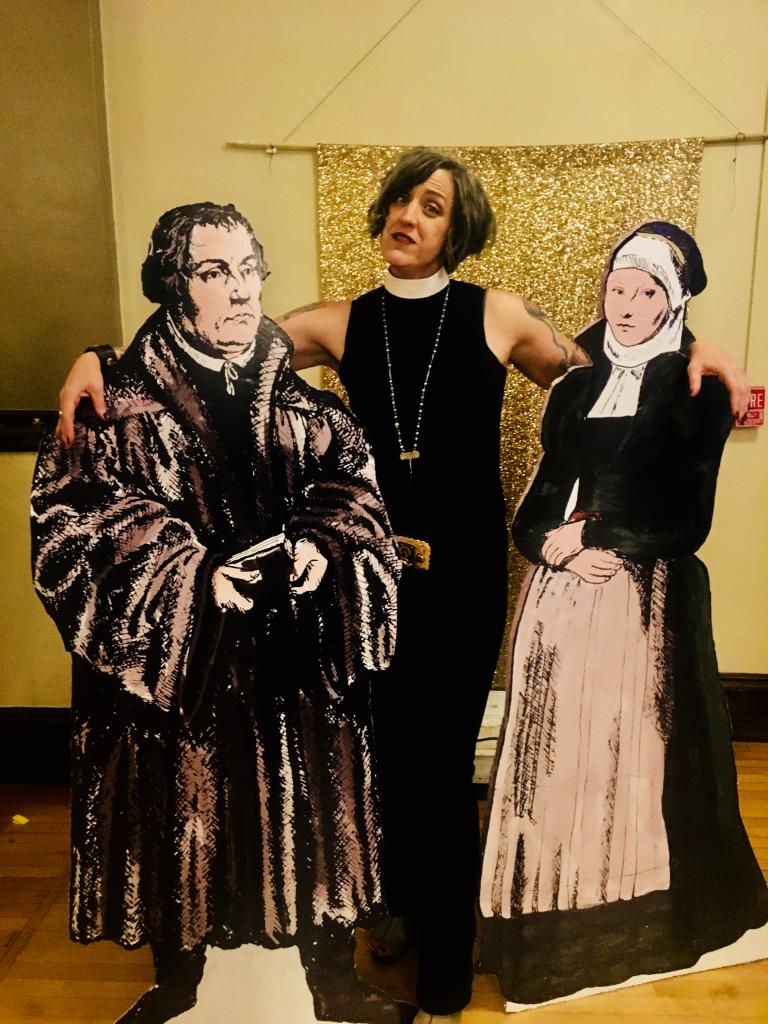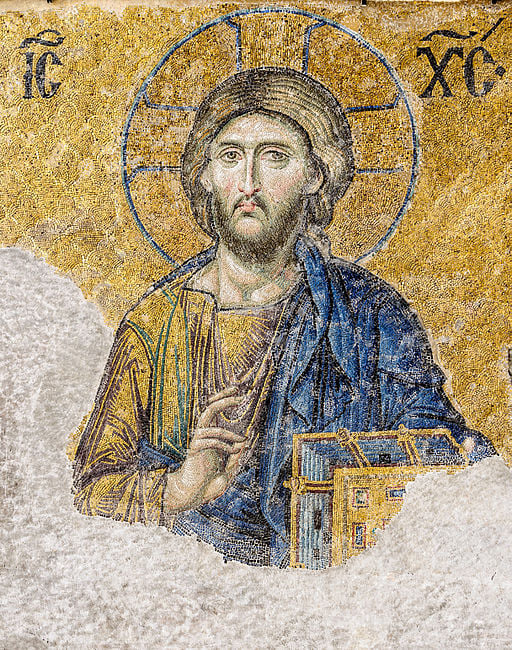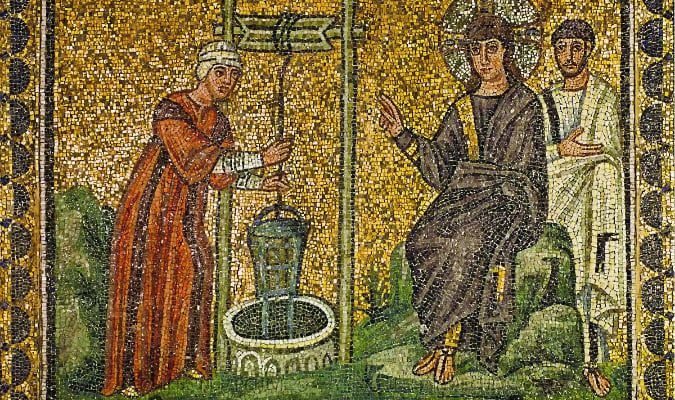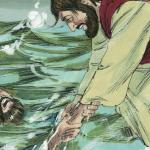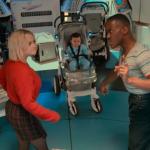On the day before Fat Tuesday, 2014, I stood in a small restaurant on Denver’s tree-lined Sixth Avenue, looking hungrily at the food set out for Billy’s memorial service. The locally owned restaurant, Satchel’s on 6th, had the simple, clean look of a place owned and run by foodies. I was famished, and the chocolates and flatbreads looked amazing, but no one else was eating.
It’s not that uncommon—people usually don’t feel hungry at a funeral; or maybe they do and think it would look bad to take advan- tage of free artisan cheeses when someone has just died. It’s always so mismatched: the people who cook in response to grief and the people who refuse to eat in response to grief. Perhaps the platters of leftovers are their own comfort when taken home by the bereaved, like piles of sustenance for the bitter days to come. But unlike everyone else in the room, my hunger was uncurbed by grief because I’d never met Billy.
A week earlier, I had answered the phone thinking it was my doctor’s office returning my call. Instead I was greeted by, “Is this Nadia?” I groaned. Like most modern Americans, I never answer the phone if I don’t recognize the number. However, just minutes before the phone rang, I had been told by my doctor’s office that they would call me right back. So this time I had picked up.
“I got your number from Becky Kunzelman,” the voice on the other end said. Yeah, not my doctor. Becky is a world-renowned CrossFit athlete and devout Christian from Denver. Turns out Becky had just read Pastrix, so when a woman from her gym asked if she knew a pastor who would do a funeral for her nephew, a young gay man who had hanged himself the day before, Becky called my coach, Neil, and asked for my number.
The funeral was to be the following Monday, but the following Monday was one of only three days off I would have that month, and I needed it. I’d been on the road at least once a week for weeks while pastoring House for All full-time and, frankly, I felt like I’d “given at the office.” She kept talking and I kept shaking my head, thinking, No way. No way. No way. Nope.
“Billy was such a creative soul,” the woman on the phone said. “But he was in a lot of pain. Emotional pain. He worked in the kitchen at Satchel’s restaurant. That’s where the funeral is, by the way, with all the kids he worked with. He was an artist, so creative, but he was tortured. Bipolar, they say, but who knows. He, um, well, he hanged himself.”
The more she talked, the more I both resisted the idea and knew that I had to do it.
“Anyhow,” she continued, “I understand if you can’t do it, but do you know another pastor who might be right for this?”
Fuck. Everything in me was trying to protect myself, trying to preserve the little unscheduled time I had. In most cases, that’s the right move. But not this time.
My congregation was pretty young, so I’d done funerals only a couple of times before, and one of those was for a good friend who had also hanged himself. PJ was creative and bipolar too, and in my initial resistance to do this funeral, it felt as though I’d almost forgotten about PJ, his funeral, and the particular pain that suicide brings to those left behind.
I said I’d need a day to think about it, but seven minutes later, I texted her. “Yes. It would be my honor to do Billy’s funeral. He sounds like one of my people.”
A week later, as I walked around Satchel’s, I didn’t touch the gorgeous food all around me. Instead, I looked at photos of Billy lovingly displayed around the room as his family, friends, and coworkers filed in. Billy seemed to have a thing for cutoff shorts and goofy smiles.
Billy’s mom sat on a wooden bench along the wall while her family held her hand. I had visited her home a couple of days earlier and asked questions about her son. She had beautiful Carole King hair, and I’d even be willing to bet there was a copy of Tapestry somewhere in her small Victorian apartment across from City Park. Her place was filled with houseplants, vibrant colors, and gorgeous mandalas one might expect from someone like herself: a faculty member of Naropa University, a Buddhist school in Boulder. Despite her grief, there was some- thing that kept her tethered to the ground. Billy’s ex-wife was there. She had thin bird wrists and short bangs, and she was sad and suspicious. I suspected she would be the first to react dismissively if I said something stupid. Billy’s sister and brother, both younger and by all accounts better adjusted, seemed both frustrated by and totally in love with their wild brother.
I listened and asked questions, and when I sensed they wanted me to say something pastor-y, I told them about my friend PJ who had committed suicide, because I wanted them to know that if love alone could have kept PJ alive, he would still be here. And how, as sacred as love is, human love is never pure or perfect. We just aren’t that kind of species. There are cracks in everything and even the most shining aspects of our lives—even love, or perhaps especially love—come with imperfection.
Often, when someone dies, we feel a combination of love and something else, and this, too, is holy. And entirely human. And they don’t cancel each other out. Love and anger. Love and disappointment. Love and emptiness. We always love imperfectly. It is the nature of human love. And it is okay.
But despite all the love in the world, when it comes down to it, none of us can know the reality of another. We can share circumstances, personality traits, even parents, yet as much as we move through our lives alongside each other, none of us can fully know the internal reality of another. These people sitting on those benches at Satchel’s, the people who loved Billy the very most and felt they knew him the very best, might never have known the type of pain Billy was in. Or the love he knew. Or the isolation he experienced.
I know what it’s like to think, in response to the suicide of someone I love, “I should have returned his last voice mail,” or, “I should have checked in on him more,” or, “I should have had more patience with him.” But I also know that’s not how it works. And after someone is lost, we are left with only what is left: our own persistent longing for things to have been different and for those we love not to have been in pain and, mostly, for them to have remained with us. I remember how angry I was at PJ, how tenderness accompanied that anger, and yet how certain I was, in the midst of my tender anger, that God could hold all of our inconsistencies, including PJ’s terminal ones.
People are cynical about religion, and about Christianity especially. I know this. I sensed that cynicism in the room at Satchel’s—that perhaps people were wondering why a Lutheran pastor was doing a funeral for a person, family, and group of people who were, for the most part, not Christian. And I get it. I can be cynical myself. Every time I see some smiley TV preacher talk about God’s plan for me or hear Sarah Palin say something irretrievably mean and stupid about poor people, or every time I pass an embarrassing billboard featuring Jesus and a fetus, I totally get why reasonable people would keep their distance. I get why having a Christian pastor at a non-Christian memorial service for a young, gay, bipolar man who took his own life could sound like a weird, even bad, idea.
Yet I felt more at home in that room than I had a few days earlier at a Presbyterian church in Indiana, and suddenly I realized that what I had initially resisted (doing a funeral for folks who weren’t my parishioners on one of my three days off that month) was actually what I desperately needed in order to be faithful to my call. These mourners still felt to me like part of my parish. And I wanted more than anything to preach about Jesus. Not in a “here’s my chance to get you to believe the right things” type of way, but more in a “I get how distasteful so much of this Christianity stuff can be, but it’s also just the most real and beau- tiful thing I have ever heard” type of way. The Jesus story connects with Billy’s because it, too, is a story of love and suffering.
So I offered to this group of nonreligious parishioners a reading from the gospel of Matthew:
For John came neither eating nor drinking, and they say, “He has a demon”; the Son of Man came eating and drinking, and they say, “Look, a glutton and a drunkard, a friend of tax collectors and sinners!” Yet wisdom is vindicated by her deeds. (11:18–19) I’ve never fully understood how Christianity became quite so tame and respectable, given its origins among drunkards, prostitutes, and tax collectors. So I read this short passage and explained that I didn’t know Billy but that I do know queer, and I know addiction, and I know depression. (Not to mention that, as a former restaurant worker, I also know what it’s like to spill shit in the walk-in and have to clean it up in the middle of the dinner rush.)
I told them that when I heard Billy was bright, an artist and musician, and when I heard that he loved his family and loved people through difficulty in relationships, and when I heard that he struggled with heroin and booze addictions and an unhelpful brain chemistry, and when I heard that he was beautifully queer and passionate and sometimes played piano in his sister’s dresses, I knew. I knew that Billy was pretty much exactly the kind of person Jesus would hang out with.
I told them that Jesus could have hung out in the high-end religious scene of his day, but instead he scoffed at all that, choosing instead to laugh at the powerful, befriend whores, kiss sinners, and eat with all the wrong people. He spent his time with people for whom life was not easy. And there, amid those who were suffering, he was the embodiment of perfect love.
I looked Billy’s mother in the eyes and said that what I know for sure is that God is always present in love and in suffering. And that God was present both the moment Billy entered this world and the moment he left it, loving him back into the arms of his Creator.
She mouthed, “Thank you.”
——
What I did not know at the time was that thirty hours after standing in a restaurant for a funeral of one child, I would stand—on Ash Wednesday — in the birthing room of another. Just a little more than a day after preaching in a bar about love and suffering and Jesus, I would hold the baby of my parishioners Duffy and Charlie in my arms and thank God for brand-new life.
God: present in love, present in rooms where women give birth, present in rooms where families wrestle with suffering and death.
What I find interesting is that death used to be more a part of life than it is for us now, and not just because we have a longer life expectancy and a lower infant mortality rate than we did two hundred years ago. Death used to be a part of life because, like birth, it was something we did at home.
Until the late nineteenth century, the front room in houses, called the parlor, was where one would receive guests, but it was also where the bodies of the dead would be laid out for visitation. People used to die at home, at which point their loved ones would wash and prepare the body and lay it in the parlor. Neighbors, friends, and family would come to see the body and perhaps stroke the hair or kiss the forehead of those who had gone to their rest. Death was a part of life. That is, until the advent of the funeral parlor, a local for-profit business that took over all that unpleasantness for us. (This is when and why the front room in our home started to be called the “living” room and not the parlor.)
We’ve relegated death, birth, and even making music to the professionals . . . all things that, until a few generations ago, used to be done by regular people like us in the home. What used to be natural— giving birth, playing instruments and singing, and dying among loved ones who will lovingly lay our bodies out in the parlor to be honored by those who loved us—is now a commercial enterprise. Not that I’m ungrateful for a lower infant mortality rate or the safety that women in high-risk pregnancies now enjoy, and not that I don’t love hearing professionally recorded music. But I do wonder if we lost more than we realized when we started hiring professionals to do for us what we used to do for ourselves.
Anyway, here I was on Ash Wednesday, standing in a birthing room at the University of Colorado Hospital, on the day that the church remembers that we are but dust and to dust we will return. With one hand, I held a small metal pot of ashes and with the other, I reached across Duffy’s recovery bed and made the sign of the cross with black ashes on her forehead, then on Charlie’s too. Duffy had that beautiful and totally exhausted look of a woman who had just given birth, and Charlie had that proud and totally exhausted look of a partner who had just spent hours feeling helpless.
“The baby too?” I then asked her parents.
Duffy and Charlie said, “Yes, please, the baby too.”
My voice strained a bit as I pressed ever so gently into the brow of baby Willa’s brand-new skin, flesh that had been exposed to air for only a few precious hours. I couldn’t completely constrain the trembling in my voice as I reminded all of us in the room that even she, full of beauty and hope and just hours from her mother’s womb, will, at her death, return to dust and the very heart of God.
And the mother mouthed, “Thank you.”
And then I knew. I knew more than on any other Ash Wednesday that the promises of baptisms and funerals, the promises of birth and death, are inextricably wrapped up together. For we come from God and to God we shall go. There is so much that gets in the way of that simple truth. And it is times like funerals and births when all the other BS just doesn’t matter anymore.
Here’s my image of Ash Wednesday: If our lives were a long piece of fabric with our baptism on one end and our funeral on another, and we don’t know the distance between the two, then Ash Wednesday is a time when that fabric is pinched in the middle and the ends are held up so that our baptism in the past and our funeral in the future meet. The water and words from our baptism plus the earth and words from our funerals have come from the past and future to meet us in the present. And in that meeting we are reminded of the promises of God: That we are God’s, that there is no sin, no darkness, and yes, no grave that God will not come to find us in and love us back to life. That where two or more are gathered, Christ is with us. These promises outlast our earthly bodies and the limits of time.
I knew as I stood in Willa’s birthing room and held the tiny infant and watched with fascination as she moved her head on her tiny neck and smacked her perfect little mouth that somehow the suffering and love of Billy’s mother’s labor, twenty-nine years earlier, was held in the hands of God. I knew in that exquisite moment that the love and suffering of another mother’s labor just today was also held in the hands of God and that she, too, must commend her child to the one from whom that child came.
Billy and Willa. Two beloved children of God whom Jesus came to save. And to claim. And to befriend. And to welcome home.
Ashes to ashes. Dust to dust.
(This is chapter 11 of Accidental Saints: Finding God in All the Wrong People available here:
Indie Bound (your local independent bookstore)
Amazon )







